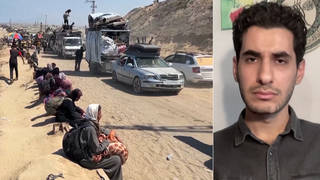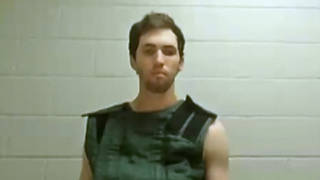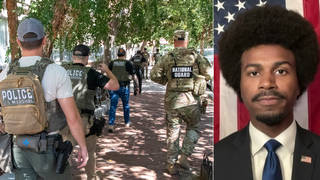
The controversial USA PATRIOT Act was passed in the wake of the September 11, 2001 attacks. Despite the protests of civil libertarians and immigrant rights groups, the Act may now be made permanent and expanded to allow for surveillance without judicial approval. We host a debate. [includes rush transcript]
The Senate Intelligence Committee voted 11 to 4 in a closed door session on Tuesday to approve an expansion of the USA PATRIOT Act.
The new measure would make permanent eight provisions of the Act, which is set to expire at the end of this year. It would also increase government surveillance powers by granting investigators access to an individual’s business records and allowing wiretaps and searches without a demonstrated link to terrorism or a federal judge’s permission.
The legislation must still be considered by the Senate Judiciary Committee, the full Senate and the House before it becomes law.
- Harvey Eisenberg, Assistant U.S. Attorney for the District of Maryland. He recently co-authored an editorial in the Balitmore Sun supporting the PATRIOT Act.
- David Cole, professor at Georgetown Law School and author of “Enemy Aliens: Double Standards and Constitutional Freedom in the War on Terrorism.” He has an article in The Nation magazine last month titled “The Missing Patriot Debate.”
Transcript
AMY GOODMAN: Today we’ll have a debate on the USA PATRIOT Act. We’re joined on the phone by Assistant U.S. Attorney for the District of Maryland, Harvey Eisenberg. He recently co-authored an editorial in the Baltimore Sun supporting the PATRIOT Act. David Cole joins us, professor at Georgetown Law School and author of, Enemy Aliens: Double Standards and Constitutional Freedom in the War on Terrorism. He has an article in The Nation magazine last month titled, “The Missing Patriot Debate.” We welcome you both to Democracy Now! David Cole, can you talk about what’s just been passed behind closed doors by the Senate Intelligence Committee?
DAVID COLE: Well, the Intelligence Committee has voted to make several provisions of the PATRIOT Act permanent, some of the provisions that are most in controversy in other committees and among other members of Congress, and it’s also voted to expand the powers the government has, most significantly by giving the F.B.I. the power to issue administrative subpoenas, which means that they can demand that the recipient of the subpoena turn over documents to them without having a grand jury —-without having some -— having impaneled a grand jury for a criminal investigation and without going before a judge and showing that there’s any basis for the subpoena. So, that’s probably the most troubling aspect, but I think the broader problem is that very little of the most troubling provisions of the PATRIOT Act are even being discussed in the hearings that have been held thus far in Congress.
JUAN GONZALEZ: We’re also joined by Harvey Eisenberg, Assistant U.S. Attorney in the District of Maryland. The original PATRIOT Act, how successful do you think it has been, and why do you think there’s been such widespread opposition? About 370 towns and municipalities around the country have passed resolutions against it.
HARVEY EISENBERG: First of all, good morning, and thank you all for inviting me to participate. Regarding the 370 towns, I can’t speak to what individual town councils, city councils do. In my opinion as a career federal prosecutor, not a political appointee, the PATRIOT Act has been beneficial to law enforcement generally in preventing the next act of terrorism. Certainly several terrorism acts have been tried, and they have been frustrated for many reasons. I’m not going to say it was exclusively because of the PATRIOT Act; that would be wrong and misleading, something I sometimes accuse my adversaries of, dealing with the law, not giving all the facts. Regarding the town councils, I really can’t say why they do what they do. I’m hoping that it’s only because they really haven’t studied the law well enough and know the peculiarities of what we need to deal with in this age.
AMY GOODMAN: So then, David Cole, what are your concerns?
DAVID COLE: Well, first of all, I think the reason that 370 cities and towns, including almost all of the major cities, the biggest cities in the country, six states have passed these resolutions, is not because they’re ignorant or don’t understand the facts, but because they’re very concerned by the way in which this administration has proceeded in the war on terror. And the PATRIOT Act is sort of the perfect example of it, because it was done in incredible haste. It was done with very little, if any, respect for the civil liberties and civil rights concerns that are always in the balance when you are seeking to increase national security. So, I think that the PATRIOT Act is a symbol of a much broader phenomenon, the same phenomenon that sees the administration asserting the right to lock up people without charges, based on the President’s say-so, as enemy combatants, the same phenomenon that sees the military using coercive interrogation tactics, up to and including torture and homicide in interrogating suspects in the war on terror. The PATRIOT Act is just one example.
Within the PATRIOT Act, I think the most troubling provisions are those directed at foreign nationals, which allow the government to deport foreign nationals for their otherwise innocent associations with any group that the Attorney General doesn’t like, that allow the government to keep out foreign nationals based on pure speech, that allow the Attorney General to lock up foreign nationals without showing that they have committed a crime and without showing that they actually are dangerous. Other provisions make it a crime for people to provide expert advice to any group that has been designated a terrorist group that criminalizes pure speech. It doesn’t matter whether the advice is to, you know, stop engaging in terrorism and pursue lawful means. It’s still a crime. Another provision gives the government the power to freeze the assets of any entity in the United States without showing that it violated any law, and then if the entity goes in and challenges the freeze order in court, the PATRIOT Act allows the government to defend its actions using secret evidence that the entity has no opportunity to see or confront. And over a half-dozen Muslim charities across the country have been closed down. Some of them might well have been funneling money to terrorist organizations, but we’ll never know, because the procedure doesn’t provide for any open adversarial testing of the government’s charges.
JUAN GONZALEZ: Harvey Eisenberg, what about some of the issues raised, especially the foreign nationals. To what degree is this much different from the old Palmer Raids of the 1920s that were directed against immigrants at that time also, when the country was facing what it believed to be a threat from socialists or anarchists?
HARVEY EISENBERG: Well, in the first place, let me specify again: I’m not a political appointee. I’m sworn to uphold the Constitution, and I respect just what Mr. Cole has said, although I disagree with some of his characterizations. I don’t believe there’s a federal prosecutor worth his or her salt that would look at a material support of terrorism case and base that accusation upon someone going in and giving expert assistant advice to not conduct terrorist activity. In fact, that wouldn’t even be — that would be laughed out of court. It would be laughed out of the Justice Department. So I’d rather deal with actualities rather than, pardon me, but absurd hypotheticals that don’t apply to the law or, at least, implementing the law. With regard to the policing of our borders, that’s a contentious issue. That one is best dealt with in Congress. I, again, am not a legislator, and I think I would be going outside the bounds of what we do. I can tell you for a fact that here in Maryland, I know of no such circumstance, and —- that would just simply picking out foreign nationals for non—— for discriminatory purposes. There’s a basis for why we police the borders at a certain time and place. We have always done it. Is it possible that someone someplace sometime will go overboard? Yes. Is it also much more likely that the system will correct itself through the judges so that Congress — through all kinds of public opinions, through debates such as this? We’re a democracy. There’s a self-correcting activity involved in this great land of ours.
AMY GOODMAN: Final question, this latest bill involving the — without getting a subpoena or a court order, going to judge or a grand jury, David Cole, being able to look at an individual’s health records, wealth records, their finances, gun records, among other issues.
DAVID COLE: This is very, very troubling. And it’s one of the things that the administration has been seeking for some time, and they’re clearly — they’re pushing for it, and unless there’s a significant opposition voiced, they’ll get it. So, I think it’s absolutely critical that listeners, you know, call their Congress people and say, “We’re opposed to, you know, the — making the PATRIOT Act permanent, and particularly opposed to the administrative subpoena provision, which expands the PATRIOT Act.”
If I could just say one thing, Amy, about this “absurd hypothetical” that I raised: It’s not an absurd hypothetical. I represent a group called the Humanitarian Law Project, which is a human rights organization in Los Angeles who has been providing human rights advocacy training to a Kurdish group in Turkey until it — that group in Turkey was designated a terrorist group. And then it became a crime for my clients, a human rights group here, to urge the Kurds in Turkey to pursue human rights avenues to resolve their disputes with the Turks, rather than violence. And we brought a lawsuit challenging the constitutionality of that provision of the PATRIOT Act and were successful. But the government didn’t argue: “Oh, we would never prosecute these people. Oh, this is frivolous. This is an absurd hypothetical.” No, in fact, what the government argued is: We have every right to prosecute this human rights group for providing human rights advocacy training to the Kurdistan Workers Party of Turkey. So these are not absurd hypotheticals that I am raising. These are actual provisions of the law that have been enforced, that the government has argued it can enforce against people who are advocating merely human rights.
HARVEY EISENBERG: For full disclosure, you should know that administrative subpoena power has been with the F.B.I. in organized crime and in drug investigations for certainly more than a decade. And it’s no different. You can make a valid argument that if it’s good for organized crime investigations and drug investigations that it is certainly good for terrorism investigations.
AMY GOODMAN: David Cole?
DAVID COLE: Well, no, in fact, the administrative subpoena powers that exist today are very limited and involve very specific kind of regulatory schemes. They are not for general criminal investigations.
AMY GOODMAN: We’re going to leave it there. David Cole, Professor at Georgetown Law School, author of the book Enemy Aliens, and Harvey Eisenberg, Assistant U.S. Attorney in the District of Maryland, co-authored a piece in the Baltimore Sun supporting the PATRIOT Act. Thanks, both, for being with us.












Media Options